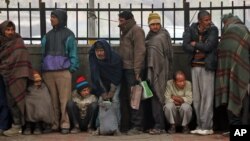NEW DELHI —
In India, the government has begun rolling out an ambitious plan to replace subsidies with direct cash payments in a bid to eliminate graft. The government says the cash transfer plan will benefit millions of poor people, but questions have been raised about how it will work.
Since the start of the new year, 245,000 people across 20 districts in India are getting pension and scholarship money transferred directly into their bank accounts, instead of having to wait to receive it from post offices or bank officials.
Officials say when fully implemented, the cash payments will help fix a broken-down system for the delivery of subsidies that amount to nearly $58 billion a year.
The impact of these welfare measures on reducing poverty has long been questioned, because subsidies for food and fuel are often siphoned off by corrupt officials or people are forced to pay bribes to receive them.
India’s Finance Minister P Chidambaram calls the cash transfer scheme a “game-changer” for poor people. “There will be no leakage. There will be no rent seeking anywhere in the system. The beneficiary will not have to pay any kind of money to get his benefit,” he explained.
India is modeling the scheme after efforts in Brazil and Mexico where such experiments have been successful. It hopes to use a biometric electronic number being given to every citizen to transfer the cash into their bank accounts.
But doubts have been expressed about how the scheme will work in the vast country of 1.2 billion people. Only 40 percent of Indians have bank accounts and only 36,000 out of the country’s 600,000 villages, where the poorest live, have banks.
Even some people who have bank accounts have voiced their preference for getting food rations rather than cash. One of them is Kanta Das. She lives in a poor neighborhood in New Delhi and participated in an experimental program to study the switch from food rations to cash.
Kanta says her family opted to receive rations in place of cash, because the money was often spent by household members on other items. As a result, she says, her young children got less food.
The government says it is proceeding with caution and for the time being, it will not switch to cash transfers for food and fuel subsidies.
However, Finance Minister Chidambaram hopes the cash transfer scheme will save the government billions of dollars by eliminating fake beneficiaries and middlemen.
“No one person can receive two benefits under the same scheme using two identities and no one can falsify an identity and get a benefit," he asserted. "That will result in considerable savings to the exchequer. The efficiency gains are incalculable. Today the system has to go through several layers, it is a maze.”
Opposition parties have voiced concerns about the cash scheme, calling it a ploy to buy votes before general elections which are due next year.
The government says that by the end of the year, it hopes to expand the new policy through most of the country.
Since the start of the new year, 245,000 people across 20 districts in India are getting pension and scholarship money transferred directly into their bank accounts, instead of having to wait to receive it from post offices or bank officials.
Officials say when fully implemented, the cash payments will help fix a broken-down system for the delivery of subsidies that amount to nearly $58 billion a year.
The impact of these welfare measures on reducing poverty has long been questioned, because subsidies for food and fuel are often siphoned off by corrupt officials or people are forced to pay bribes to receive them.
India’s Finance Minister P Chidambaram calls the cash transfer scheme a “game-changer” for poor people. “There will be no leakage. There will be no rent seeking anywhere in the system. The beneficiary will not have to pay any kind of money to get his benefit,” he explained.
India is modeling the scheme after efforts in Brazil and Mexico where such experiments have been successful. It hopes to use a biometric electronic number being given to every citizen to transfer the cash into their bank accounts.
But doubts have been expressed about how the scheme will work in the vast country of 1.2 billion people. Only 40 percent of Indians have bank accounts and only 36,000 out of the country’s 600,000 villages, where the poorest live, have banks.
Even some people who have bank accounts have voiced their preference for getting food rations rather than cash. One of them is Kanta Das. She lives in a poor neighborhood in New Delhi and participated in an experimental program to study the switch from food rations to cash.
Kanta says her family opted to receive rations in place of cash, because the money was often spent by household members on other items. As a result, she says, her young children got less food.
The government says it is proceeding with caution and for the time being, it will not switch to cash transfers for food and fuel subsidies.
However, Finance Minister Chidambaram hopes the cash transfer scheme will save the government billions of dollars by eliminating fake beneficiaries and middlemen.
“No one person can receive two benefits under the same scheme using two identities and no one can falsify an identity and get a benefit," he asserted. "That will result in considerable savings to the exchequer. The efficiency gains are incalculable. Today the system has to go through several layers, it is a maze.”
Opposition parties have voiced concerns about the cash scheme, calling it a ploy to buy votes before general elections which are due next year.
The government says that by the end of the year, it hopes to expand the new policy through most of the country.
